Iran Files Case Against Two Prominent Actresses Over Hijab Rebellion
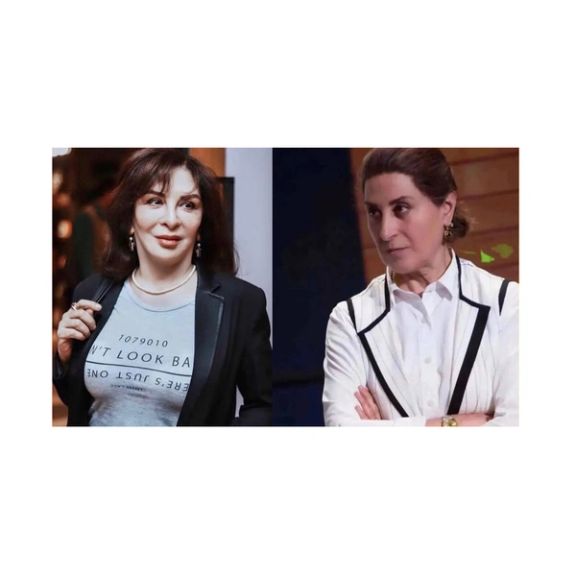
A case has been filed against two of Iran’s leading actresses who recently attended a ceremony without the mandatory hijab.

A case has been filed against two of Iran’s leading actresses who recently attended a ceremony without the mandatory hijab.
Tehran Police said Afsaneh Bayegan and Fatemeh Motamed Arya, legends of Iranian film and television, will now be investigated by the judiciary. If found guilty, the two women could face harsh prison sentences along with thousands of other protesters since September.
The case was filed after they appeared in public without the headscarf on Sunday night at a ceremony to honor actor Atila Pesyani.
At the ceremony, prominent Iranian cinema star Reza Kianian spoke of women’s right to refuse the headscarf, made mandatory since the Islamic Republic in 1979.
The government has refused to back down on its crackdown against the mass rebellion across the country, several businesses closed down for not enforcing rules imposed by the regime.
Celebrities and footballers supporting the protests have been singled out with businesses closed down, travel bans, bank accounts being frozen and restricting access to communications.
It comes after a wave of famous faces have used their social media accounts to voice their support for the protests that began in mid-September following the death of Mahsa Amini in police custody.
Many other artists and athletes, including popular Golab Adineh, Katayoun Riahi, and Pantea Bahram have also refused to wear the hijab in public and published photos of themselves casting off their headscarves on social media.
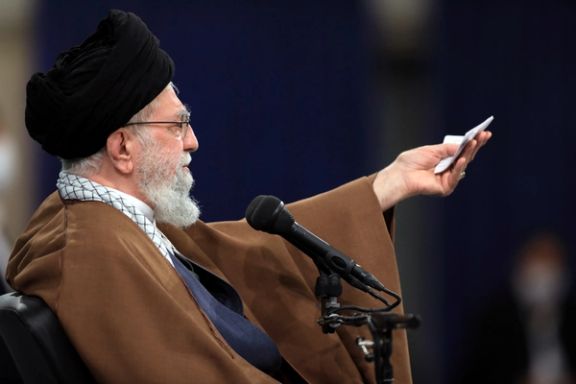
A former ally and now vocal opponent of the Supreme Leader says Ali Khamenei’s insistence on hijab enforcement is a bid to keep him popular among the hardliners.
Abolfazl Qadyani (Ghadyani), a staunch revolutionary in the 1970’s and 80’s and become a critic of Khamenei after the Green Movement, said in an article on Monday that the relentless hijab crackdown is “political haram”, branding the regime as “illegitimate rule”.
He coined the term “politically haram” from a speech given by Supreme Leader Ali Khamenei on April 4 when he said “discarding hijab is haram (sin) based on Sharia and also politically”, emboldening officials to embark on stricter measures.
Green Movement, also referred to as the Persian Awakening or Persian Spring by the western media, refers to a political movement that arose after the June 2009 presidential election and lasted until early 2010 in which people were protesting against the results of the rigged election that kept Mahmoud Ahmadinejad in office.
It was the biggest revolt against the regime until the current wave of uprising ignited by the death in custody of 22-year-old Mahsa Amini. Ahmadinejad’s main rival Mir-Hossein Mousavi has been under house arrest since 2011.
“His insistence on imposing hijab has only one reason: seeking legitimacy in the body of the religious-traditional part of Iranian society,” Ghadiani said.
The former revolutionary and an ex-comrade in arms of Khamenei said that the Supreme Leader "knows well that the achievement of his 30-year-old rule was nothing but the spread of poverty, injustice, corruption, and economic, political, and judicial banditry."
Ghadiani, who was a political prisoner both during the monarchy and the Islamic Republic, claims that Khamenei seeks to project this idea among a small fraction of the religious community, who still trusts the Islamic Republic is redeemable.
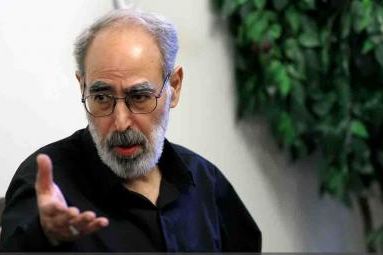
"Women whose hijab is not their personal choice will not give in to such an illegitimate and unreasonable whim, even if the regime growls and closes businesses and drags women and men to the court of justice," he said.
He and his comrades helped the clerics consolidate power 43 years ago. But he became a critic of Khamenei when in 2009 the Supreme Leader backed the disputed official results of the presidential election that kept Mahmoud Ahmadinejad in office, and triggered months of protests.
Ghadiani, who in the past believed in reforming the Islamic Republic, said earlier in the year that “Reforms are not possible,” arguing that the reform movement failed to produce any results in 25 years. “Ebrahim Raisi, an illiterate murderer has become president.”He also said that Islamic Republic’s ruling class “is unique in corruption and exporting corruption among its peers and tyrants around the world. They have turned religion into a tool for repression.”
Several figures who used to be proponents of the regime have started criticizing the Islamic Republic in recent months, especially following September 2022, when the “Women, Life, Freedom” movement began. The regime has killed well over 500 people and arrested nearly 20,000 protesters to prove that it did not kill Mahsa Amini.
Iran’s Sunni leader Mowlavi Abdolhamid, who has been delivering historic speeches every Friday in the past several months, said earlier in the day that "If the solution to people's problems is to arrest and detain, then arrest and imprison all of us.”
“If the people's problems are solved by arresting the protesters and politicians, I request them to hand themselves over to the prison so that the people's problems are solved," he said.
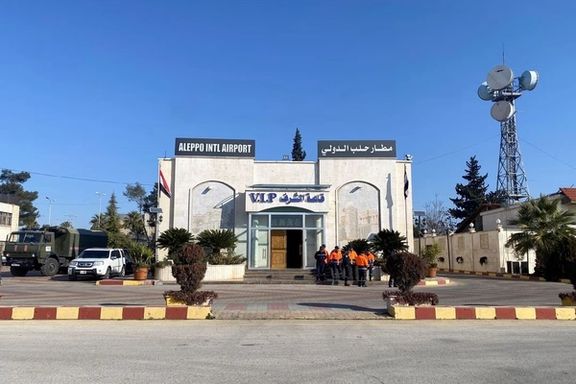
A soldier has been killed and seven others wounded, including 2 civilians, in an Israeli airstrike on Aleppo Airport on the eve of the Iranian president’s visit to Syria.
According to Syria's state news agency, SANA, Israeli warplanes attacked the airport and other sites near the city on Monday night, leaving the airport out of service.
The symbolic attack, one of a series in recent years in the shadow war between Israel and Iran, comes right before Iranian President Ebrahim Raisi travels to the Arab country at the official invitation of the Syrian president for a two-day visit.
Raisi’s visit is the first by an Iranian president since the start of Syria's civil war in 2011.
SANA claims Syrian air defense intercepted several incoming missiles following the Israeli invasion, a frequent claim by Damascus questioned by military analysts.
Israel has been attacking what it has described as Iran-linked targets in Syria since 2017, to prevent Islamic Republic forces getting entrenched near its northern borders and weapons reaching the Lebanese Hezbollah.
Iran intervened in the Syrian civil war as early as 2011 to defeat a rebellion against strongman Bashar Al-Assad.
Iran says its officers serve in an advisory role in Syria at the invitation of Damascus. Hundreds of Iranian forces and thousands of proxy militiamen including senior officers have been killed in Syria during the war.
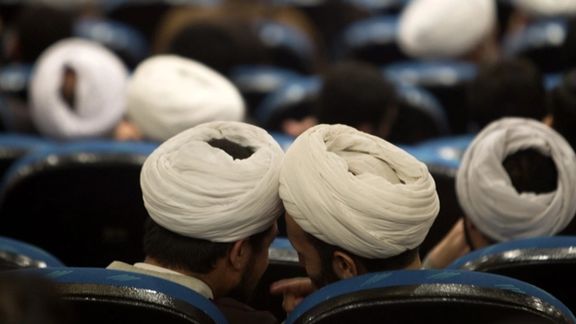
Following three attacks on clerics in Iran in less than one week, Chief Justice Gholamhossein Mohseni Ejei called for swift and strict measures against the attackers.
Conservative Nameh News quoted Ejei as saying, "The enemies are hatching conspiracies to undermine Iran's security," but he did not say who the enemies were.
Several Iranian politicians and journalists had warned earlier that the government's violent treatment of Iranian protesters will entail similar reaction by the people.
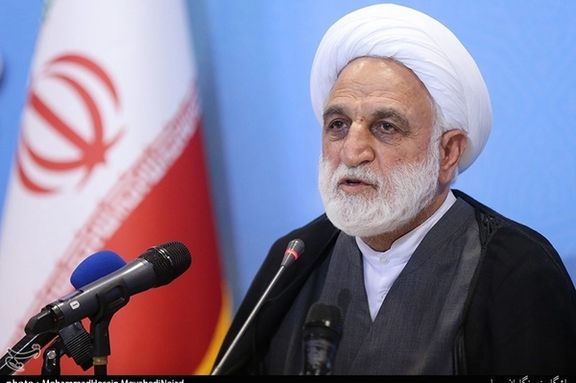
On April 26, a guard at a bank in Babolsar by the Caspian Sea shot Abas Ali Soleimani, a high-ranking cleric who was a member of Iran's Assembly of Expert and a former provincial representative of Supreme Leader Ali Khamenei. The cleric died instantly but the case remains a mystery.
His family say he was at the bank to transfer some money, but social media users say one does not need to go to a bank to transfer money. Another account of the event indicates that the guard, a former policeman killed the cleric when he found out that he was waiting to withdraw a huge amount of money. According to witnesses on the scene the frustrated former policeman was having financial problems and was angry about inequalities in society.
Later, another cleric, a young man was run over by a car and was dragged in the streets for quite a while before the driver steered away and escaped.
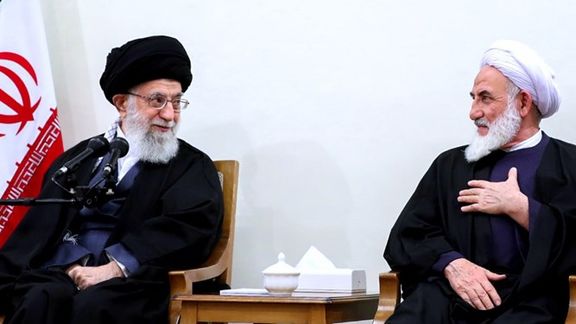
In one of the latest violent events against clerics, early in the morning of April 29, a car ran over two seminary students [clerics] at a bus stop in in Qom. Subsequently, the driver came out and stabbed one of the clerics. The stabber then attacked the police and wanted to disarm them, but he was finally arrested by the "brave policemen."
There is also an unconfirmed anecdotal account of two other clerics who were tied up to a tree and harassed by youngsters in Qaleh Hassan Khan in southwest Tehran.
A cleric in Qom, Alavi Boroujerdi, has criticized the government for creating the divide between the people and the clerics. He reiterated that the government has made mistakes.
He told state officials, "Do not say anything to annoy the people. It is unthinkable to see a cleric being run over in the street in a religious city such as Qom and then stabbing the poor man to make sure that he is badly wounded. Is this the way the people used to treat us?" asked Alavi Boroujerdi.
Chief Justice Ejei told Judiciary officials, "do not waste any time as soon as the attackers have been arrested, make them taste justice!" This was exactly the kind of words Boroujerdi advised officials to avoid if they do not wish to annoy the people.
During previous weeks, while the government was keen to enforce compulsory hijab rules as women defied the imposed lifestyle and took to the streets, many clerics, particularly those in the government used vulgar words about Iranian women and some politicians such as the hard-line editor of Kayhan daily, Hossein Shariatmadari, suggested that unveiled women should be deprived of the social rights and their ID cards should be confiscated.
Among those who criticized Shariatmadari for the comment was a female adviser to President Ebrahim Raisi, Sakineh Sadat Pad who called the suggestion "illegal."

The use of “jihadi groups” to enforce hijab rules has turned the capital’s metro stations into a battleground with women who are refusing to wear the hijab.
Videos circulating on social media show black veiled women warning female passengers over hijab and plainclothesmen and uniformed agents standing at the ticket gates preventing the women who ignore the warnings from passing through the ticket gates.
Tehran’s mayor, Alireza Zakani said at a city council meeting Sunday that the municipality has formed a special uniformed security unit to stop unveiled women from passing through the ticket gates.
“We will proceed according to the country’s laws in this regard. Our first step is issuing notices, then we issue warnings to the unveiled [women], and in the third stage we prevent them from entering the metro stations,” Zakani said.
Hijab enforcement at Tehran metro.
Social media users say arguments break out very frequently between hijab defying women and their companions with hijab enforcers. The battle continues even after women pass through the ticket gates and onboard the train where arguments often break out between vigilantes and hijab enforcers with women who remove the veil after passing the checkpoint.
As a last measure, Tehran municipality has installed screens between the metro cars allocated to women and other cars that can be used by men or both genders. Zakani claimed that installing such screens started in Tehran and “is now being copied by other countries,” without mentioning which countries have done so.
The main reason for installing screen barriers is preventing men from entering the cars allocated to women and harassing them,” Mayor Zakani claimed.
The CEO of Tehran Metro, Masoud Dorosti, said the installation of the screens had started in early March and such screens would be installed in all metro trains within the next few weeks.
Dorosti claimed that the screens, which he called “retaining doors”, were installed by popular demand and have been welcomed.
Referring to the installation of the screens in an article entitled “Living the Magic Realism” Monday, Mehdi Afrouzmanesh, deputy editor of the reformist Ham Mihan newspaper, said it is unbelievable that the authorities have resorted to such measures. Installing screens between metro cars and other things that happen in Iran are like Gabriel Garcia Marquez’s surrealistic stories in which things that are hard to believe but not impossible happen, he wrote.
As another example of such unbelievable happenings, he mentioned the declaration of President Ebrahim Raisi’s deputy in women’s affairs, Ensieh Khazali, “who, as the person in charge of improving the quality of women’s life, said proudly that she married when she was sixteen.”
Woman playing a song on harmonica at a Tehran metro station unveiled as an act of protest.
In the past few weeks authorities have sealed thousands of businesses including restaurants, cafes, tourist accommodations, retail shops and even a counselling clinic and a gym -- in Tehran and other cities for women’s refusal to wear the compulsory hijab.
Several shops in Opal mall, a massive modern shopping center with over 450 businesses in Tehran, which was shut down last week were sealed again Sunday immediately after the mall’s re-opening. According to the reformist Shargh daily, the closure of the mall had resulted in the loss of around 2,500 jobs.
The recent campaign to enforce hijab rules has caused some violent incidents involving pro-hijab vigilantes and women who defy it. A 60-year-old woman had a cardiac arrest this week when a fight broke out between vigilantes and members of her family over hijab.
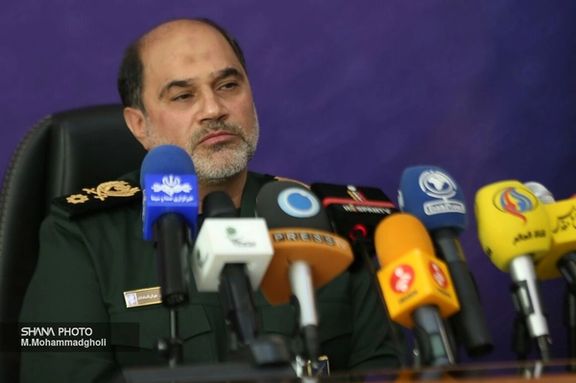
Commander of Iran’s Revolutionary Guard’s Khatam al-Anbiya contracting arm was removed from his post only two years after being in office.
n Monday, Brigadier General Hossein Housh Al-Sadat was replaced by another IRGC commander Abdolreza Abed.
As a top commander in Iran's western Kordestan province during the Iran-Iraq war in the 1980s, Abed led IRGC engineering units. He has also served as the CEO of oil, gas and petrochemical holding in Khatam al-Anbiya.
When the former Commander of Khatam-al Anbiya Construction Headquarters Saeed Mohammad announced his bid for presidency in 2021, Housh al-Sadat replaced him.
At the time some politicians had opposed Housh Al-Sadat's appointment questioning at his financial integrity.
Khatam al-Anbiya Construction Headquarter is one of Iran's largest contractors in industrial and development projects. It was created during the 1980–88 Iran–Iraq War to help rebuild the country and has diversified over the years into companies dealing with mechanical engineering, energy, mining, and defense.
Involvement of the IRGC in business began in earnest two decades ago and has become a highly controversial issue in the country. Former president Hassan Rouhani in 2017 publicly criticized the practice and met a quick reaction by hardliners. He had to retract his statements at the time.
In February, the head of Iranian National Tax Administration (INTA) threatened a reporter who asked him why Khatam-al Anbiya does not pay taxes since 2017.
In response, the INTA chief threatened the reporter, saying he has to provide documents to back up his question, and if the documents are not presented, the prosecutor will indict him.
No reporter in Iran can obtain such documents.